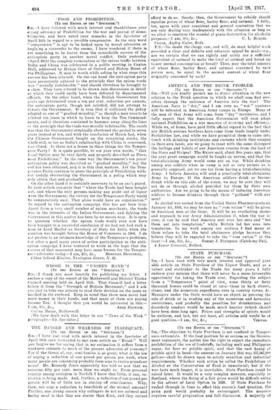THE DANGER AND WEAKNESS OF INADEQUACY.
[TO THE EDITOR OF THE " SPECTATOR."]
SIR , —I have just read with much interest in the Spectator of April 14th (now forwarded to me) your article on " Bread." Will you forgive me for saying that in my estimation it suffers from a weakness common to much of the present advocates of economy? For if the threat of, say, semi-famine is so great, what is the use of urging a redaction of one pound per person per week, when many people are consuming probably from nine to twelve pounds or more? Mr. Kennedy Jones apparently has told us now that we consume fifty per cent. more than we ought to. From personal inquiry among cottager& in Norfolk I know that little, if any, re- clection is being made. And, further, a reduction of one pound per persOn will be of little use in staving off semi-famine. Why, then, not urge a reduction to two-thirds of the normal amount? Further, one strong reason why cottagers do not use oatmeal and barley meal is that they are dearer than flour, and they cannot
afford to do so. Surely, then, the Government by subsidy should equalize prices of wheat flour, barley flour, and oatmeal. I fully, too, agree with your consistent and general contention that we are only dealing very inadequately with the situation so long as we allow to continue the scandal of grain destruction for alcoholic
P.8.—No doubt the clergy can, and will, do most helpful work provided a clear and definite and adequate appeal be made—e.g., are we certain that we can rightly and safely use a sufficient equivalent of oatmeal to make the total of oatmeal and bread up to our normal consumption of bread? Thus, may the total amount of wheat flour, barley flour, and oatmeal consumsd by each person now, be equal to the normal amount of wheat flour originally consumed by each?


































 Previous page
Previous page